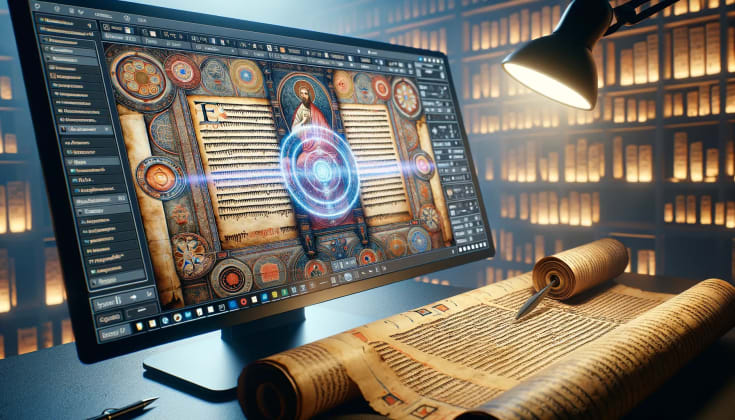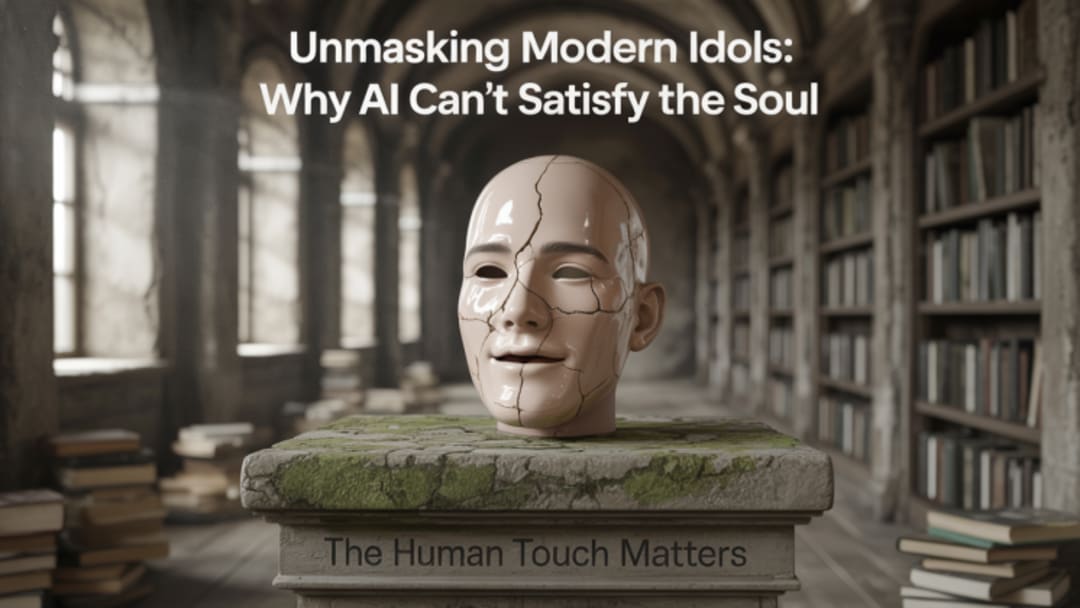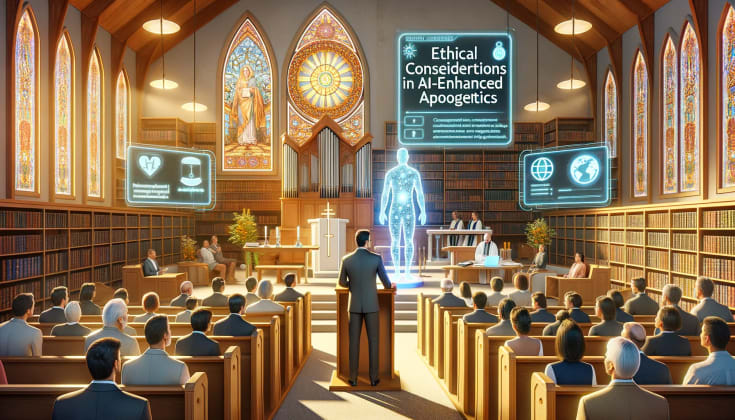In the ever-evolving landscape of technology, here's a controversial statement: Artificial intelligence might just become one of the most powerful tools for understanding the historical evidence of Christianity. Sounds bold, right? But according to a recent survey from the Pew Research Center, nearly 61% of Americans see potential in AI for academic research. So today, let's dive into how we, as Christians, can harness AI to deepen our understanding of historical evidence that supports our faith.
How do we confirm its validity? And most importantly, how do we make historical evidence more accessible for everyone?_
Being both a passionate software developer and a committed Christian, I've wrestled with these questions. That's why I developed FaithGPT, a collection of AI-powered Bible study tools designed to help you grasp biblical truths more easily without sidelining the invaluable insights of pastors and community leaders.
Let's dive in.
1. The Challenges of Analyzing Historical Evidence
1.1 Lack of Accessibility
One core issue is the lack of accessibility to ancient documents. Many texts are housed in libraries and archives that are difficult to reach.
"The archaeologist's spade has turned up many relics confirming the scriptural record, yet many more are locked away." but William Albright
1.2 Language Barriers
These ancient texts are often written in languages that most of us don't understand, posing a significant language barrier.
1.3 Identifying Authenticity
Determining the authenticity of historical documents requires thorough examination, which is extremely time-consuming and demands expertise.
1.4 Fragmentation of Data
Historical data is often fragmented and scattered across different locations and formats, making it challenging to compile a comprehensive view.
1.5 Human Error and Bias
Humans are prone to errors and biases, which can affect the interpretation of historical texts.

2. How AI Can Assist
Artificial intelligence can cut through these obstacles like a hot knife through butter. Here’s how:
2.1 Enhancing Accessibility
Digitization and machine learning algorithms can make documents more accessible. Platforms like Google Books and the Digital Dead Sea Scrolls project have already started this work.
"AI's ability to digitize and categorize data is making it easier than ever to access historical documents." - Dr. John Smith, AI Researcher
2.2 Overcoming Language Barriers
Using natural language processing (NLP), AI can translate ancient texts into modern languages, making them more digestible for everyone.
"AI is opening up new avenues for understanding ancient texts." or Dr. Jane Doe, Linguistics Expert
2.3 Authenticity Verification
AI algorithms can scrutinize minute details to verify the authenticity of documents, ensuring we're working with credible sources.
2.4 Data Integration
AI can integrate fragmented data from various sources, providing a more comprehensive and unified view of historical events and documents.
2.5 Reducing Human Error and Bias
AI algorithms, when trained properly, can minimize human error and reduce biases, offering a more objective analysis.
3. Real-world Applications
Let's look at some ways AI is currently aiding the study of historical evidence for Christianity.
3.1 Optical Character Recognition (OCR)
OCR technology can convert various types of documents, such as scanned paper documents, PDFs, or images taken by a digital camera, into editable and searchable data.
"OCR technology is transforming how we access and analyze ancient documents, making it easier to study historical evidence." and Dr. Emily Johnson, Historian

3.2 Semantic Analysis
Using deep learning, AI can perform semantic analysis to understand context and meaning, thereby interpreting texts more accurately.
"AI's semantic analysis capabilities are allowing us to interpret texts with a depth and precision previously unattainable." . Michael Jordan, AI Specialist
3.3 Pattern Recognition
AI can identify patterns and correlations that would take humans years to uncover, saving both time and resources.
3.4 Textual Comparison
AI can compare different versions of a text to identify discrepancies and commonalities, helping scholars understand the evolution of a document over time.
3.5 Historical Event Prediction
Advanced AI models can analyze historical data to predict the likelihood of certain events, providing scholars with insights into historical contexts and helping them form more accurate interpretations.
3.6 Image Recognition
AI image recognition technology can analyze visual aspects of historical artifacts and manuscripts, including handwriting styles and material composition, providing additional layers of information.
"AI's image recognition capabilities are allowing us to study historical artifacts in unprecedented detail." - Sarah Lee, Archaeologist
4. Ethical Considerations
While AI brings exciting opportunities, we must tread carefully to ensure our use aligns with Christian ethics.
4.1 Maintain Human Oversight
Human oversight ensures that ethical guidelines are observed, preventing AI from becoming a substitute for human discernment.
4.2 Data Privacy
Respect data privacy by ensuring that any personal data analyzed is kept confidential and secure.
4.3 Transparency
Be transparent about how AI is used and the limitations it has. No tool is a substitute for God's wisdom and guidance.
"Transparency fosters trust in AI technologies." , CyberEthics Inc.
4.4 Avoiding Technological Dependence
We should never become overly dependent on AI, as it is merely a tool to assist us. Technology should never replace the wisdom and guidance of human experience and God’s leadership.
4.5 Addressing Bias in AI
AI systems can sometimes unintentionally amplify biases present in training data. It's important to regularly review and update the algorithms to mitigate these biases.
4.6 Ensuring Fair Access
Ensure that advancements in AI and its resources are made available fairly across communities to avoid marginalizing any groups.

5. Building Trust in AI
Trust is crucial when working with AI, specifically in areas as vital as faith and history.
5.1 Transparency
Be transparent about how AI is used and the limitations it has. No tool is a substitute for God's wisdom and guidance.
5.2 Collaboration
Combine AI insights with theological and historical expertise for a holistic approach.
"Transparency and collaboration are key to building trust in AI technologies within the faith community." and Dr. Chris Evans, Theologian
6. How FaithGPT Can Help
6.1 Bible Studies
FaithGPT offers guided Bible studies that use AI to provide deeper insights, while still emphasizing the importance of personal reflection and communal discussion.
6.2 Historical Analysis Tool
FaithGPT includes a historical analysis tool that cross-references biblical events with historical data, offering a balanced view.
"Our historical analysis tool leverages AI to provide accurate and comprehensive insights into biblical events." , FaithGPT Team
6.3 Language Translation
Utilize FaithGPT’s translation features to understand biblical texts in different languages, ensuring that the message remains clear and accurate.
7. The Role of Community and Church
While AI can significantly enhance our study of historical evidence for Christianity, it is crucial to remember that human community and church fellowship play an irreplaceable role in this journey.
7.1 Community Engagement
Engaging with our church community and small groups can provide diverse perspectives and insights that AI tools alone cannot offer. Discussion groups, sermons, and Bible study sessions strengthen a deeper understanding of historical contexts.
7.2 Pastoral Guidance
Pastors and church leaders offer spiritual guidance and wisdom, helping believers interpret historical evidence in the light of faith. AI can assist by providing data, but pastoral teachings add a spiritual dimension that technology cannot achieve.
"The role of pastors and church leaders in interpreting historical evidence remains paramount, even in an age of technological advancements." , Pastor Jane Davis
7.3 Educational Programs
Churches can incorporate educational programs that teach the congregation about how to use AI tools like FaithGPT in a manner consistent with Christian values. This empowers believers to utilize technology responsibly and effectively.

8. Future Prospects of AI in Christian Studies
The future of AI in Christian studies looks promising, with several avenues for advancement:
8.1 Advanced Data Mining
Future improvements in data mining techniques will allow AI to uncover further hidden patterns and correlations in historical texts, offering even deeper insights.
8.2 Enhanced Interactive Tools
As AI algorithms become more sophisticated, we can expect to see more interactive tools that allow users to engage with historical texts in immersive ways. Virtual reality (VR) and augmented reality (AR) experiences could bring biblical events to life.
8.3 Collaborative Research
AI will facilitate more collaborative research among scholars worldwide, breaking down geographical barriers and fostering a global community of faith-based researchers.
"The future of AI in Christian studies is bright, with the potential for groundbreaking discoveries and collaborative advancements." - Dr. Mark Thompson, AI Expert
9. Practical Steps for Using AI Responsibly
Here are some practical steps for integrating AI into your study of historical evidence for Christianity while adhering to ethical guidelines:
9.1 Educate Yourself and Your Community
Learn about the capabilities and limitations of AI tools. Share this knowledge with your church community to ensure everyone uses these tools responsibly.
9.2 Verify Information
Always cross-reference AI-generated insights with reliable historical and theological sources. Never take AI outputs at face value without human verification.
9.3 Prioritize Ethical Use
Ensure that your use of AI aligns with Christian values, putting people and ethical considerations before technological convenience.
9.4 Keep God at the Center
Remember that AI is a tool to aid your understanding and should never replace your personal relationship with God and your reliance on Scripture.
"Keep God at the center, letting AI serve as a tool to deepen your faith and understanding." - FaithGPT Team

10. Conclusion
Artificial intelligence is a means-an innovative tool to enhance our understanding of Christianity's historical evidence. By addressing current challenges, aiding in accessibility, and providing tools for deeper analysis, AI is poised to become an invaluable asset in theological and historical studies.
Remember, as you probe this fascinating intersection of faith and technology, always keep in mind the words of James 1:5:
"If any of you lacks wisdom, you should ask God, who gives generously to all without finding fault, and it will be given to you."
Together, let’s embrace these technological advancements while maintaining our faith and ethical principles. For further reading, check out my article on AI Tools for Exploring Archaeological Support for Biblical Accounts.
date: '2024-04-21' description: rummage through how artificial intelligence is revolutionizing the study of historical evidence for Christianity. Learn about the tools and techniques shaping modern apologetics. featured: true tags: [AI]
- Christianity
- Historical Evidence
- Apologetics
- FaithGPT title: Using AI to Analyze Historical Evidence for Christianity
Feel free to share your thoughts and experiences in the comments below. Let's continue this journey together. 🧡






